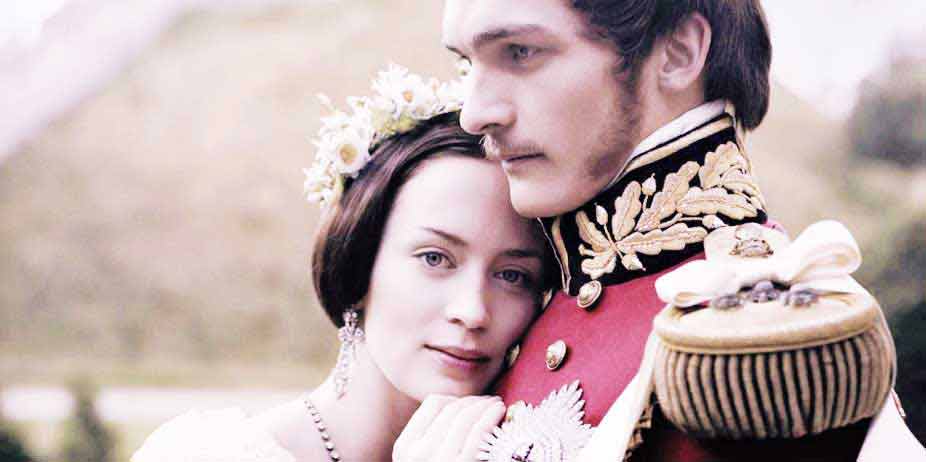The Young Victoria (2009)
England's female monarchs have fascinated me since a
young age. Victoria is the one I know the least
amount about thus far, but this film has encouraged
me to pick up several biographies on her. A European
release with no fixed release date on our side of
the Atlantic (hopefully, it will appear just before
Oscars season), it is a quiet masterpiece about a
fascinating woman -- and the longest reigning
monarch in English history.
The only heir to the British throne, young Princess
Victoria (Emily Blunt) is considered a pawn by her
mother's manipulative secretary Sir John Conroy
(Mark Strong), who hopes the king will die before
she comes of age, so he might rule through her as
Regent. A favorite of King William (Jim Broadbent)
and having inherited her father's defiance, Victoria
refuses to sign away her sovereignty. Various
monarchies across Europe are aware that soon the
state will be in her youthful fingers and so parade
a number of suitors in the hope of earning her
attention. Foremost among them is her talented,
mild-mannered cousin Albert (Rupert Friend), who
swiftly wins her affection through honesty rather
than flattery. The two form an unlikely friendship
that accumulates in letter writing when apart, an
event that rapidly becomes precious to both in spite
of the fact that all their correspondence is
carefully poured over by their superiors.
When William dies unexpectedly one night, Victoria
assumes the position as Queen and immediately uses
her authority to prevent her mother (Miranda
Richardson) from further interference in her
affairs. Tempestuous rivalries in Parliament give
her an unsettled early reign and she relies heavily
on the advice of Lord Melbourne (Paul Bettany),
something that disconcerts Albert as Melbourne is
known to have his own agenda. Inexperienced and
naive, Victoria will face public disapproval over
her political decisions and an uncertain future,
until Albert lends his steadying hand. While these
young lovers have been depicted in film before, it
has never been with quite as much beauty, taste, and
elegance. This production knows how to do it right,
with quiet but unique camera movements that
perfectly capture not only the spirit and enthusiasm
of the young monarchs, but the beauty that surrounds
them -- the exquisite costume design, the lavish
rooms, and crystal-lined tables.
Its greatest attribute is how likable its leading
characters are -- halfway through their first
conversation, the audience is in love with Prince
Albert. When he goes dashing downstairs to read
Victoria's letters, we smile at his enthusiasm, and
experience his frustration when she attempts to
treat him as a subject rather than a husband. Their
scenes together are quiet and gentle and sweet.
Victoria is lively and delightful, a monarch you
immediately like. The acting is lovely from a
talented range of accomplished thespians -- among
them many familiar faces. It is not slow moving in
spite of its subject matter and has the wisdom to
end where it does, rather than pursuing further into
their lives. (Even so, the announcements over the
closing credits as to what happened later brought
dampness to my eyes.) What I liked most about it is
that Victoria and Albert fell in love through their
letters. I find that terribly sweet and truly
romantic. I also appreciate that filmmakers
treasured them enough not to show us too much of
their intimacies.
It is an altogether enjoyable experience
that I hope is not kept from Americans too long, for
it is a movie that will be a treasured addition one
day to my personal collection. There was not a
misstep in it anywhere, for everything about it was
wonderful. I thought the personal touches
(Victoria's affection for her dog, for example) were
an especially nice touch, as was giving a voice to
Queen Adelaide (Harriet Walter). Her scenes of
quietly encouraging and guiding Victoria were among
my favorites.
Some of the moments are painful -- it is difficult
to watch Victoria's anguish at the treatment of her
mother by the king, and to witness her own
estrangement from the woman -- but there is also a
sense of accomplishment, for throughout we are aware
that this young woman became one of the most
celebrated monarchs in history.
Sexual Content:
There are several scenes in which they kiss, or are
familiar with one another in bed, but nothing
inappropriate or too suggestive. A remark is made
about the need to put Albert in Victoria's bed for
political purposes.
Language:
Mild language intrudes in the form of one profanity.
Violence:
Restricted to a man being
injured; we see him bloodied about the arm and then
learn he will be all right. There are a few scenes
of intensity in which Sir John bodily threatens
Victoria. Once, he grabs her by the arm and forcibly
throws her onto a couch. There are several
passionate arguments.
Other:
None.

